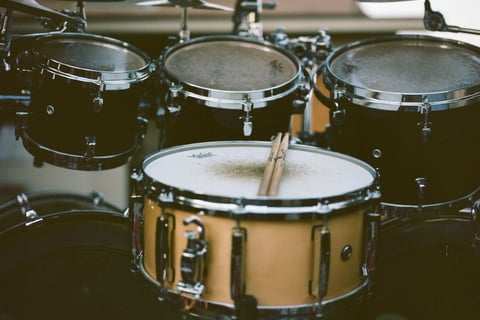Essential Accessories for Drum Maintenance: Top Tools Every Drummer Needs
Every drummer should have a drum key, practice pad, and protective cases as the bare minimum for proper drum maintenance and care. These tools allow you to tune your drums, practice quietly, and transport your kit safely. Investing in quality accessories not only preserves your drums but also enhances your overall playing experience.
DRUMS & PERCUSSIONS
Essential Accessories for Drum Maintenance: Top Tools Every Drummer Needs
Keeping your drums in top condition requires more than just talent and practice. The right accessories can make a world of difference in maintaining your kit's sound quality and longevity. From tuning tools to cleaning supplies, having the essential drum maintenance accessories at your fingertips ensures your instrument stays in peak form.
Every drummer should have a drum key, practice pad, and protective cases as the bare minimum for proper drum maintenance and care. These tools allow you to tune your drums, practice quietly, and transport your kit safely. Investing in quality accessories not only preserves your drums but also enhances your overall playing experience.
By equipping yourself with the right drum maintenance tools, you'll be prepared to tackle any issues that arise, whether you're at home, in the studio, or on stage. Let's explore the must-have accessories that will help you keep your drums sounding great and looking their best for years to come.
Understanding Drum Anatomy
Proper drum maintenance requires a solid grasp of drum anatomy. Familiarizing yourself with the key components of your drum kit will help you identify issues and perform essential upkeep.
Shell Condition and Maintenance
The shell forms the core of your drum, significantly impacting its sound and resonance. Regularly inspect your drum shells for cracks, dents, or warping. Clean the shells with a soft, dry cloth to remove dust and fingerprints. For deeper cleaning, use a mild soap solution and dry immediately.
Wooden shells may require occasional oiling to maintain their luster and prevent drying. Apply a thin layer of lemon oil or specialized drum shell oil every few months. This helps protect the wood from humidity changes and enhances its natural beauty.
Drum shells come in various materials, each requiring specific care. Maple shells benefit from gentle cleaning and minimal exposure to extreme temperatures. Birch shells are more resilient but still need protection from moisture.
Hardware and Mounting Systems
Your drum's hardware and mounting systems play a crucial role in stability and tuning. Regularly check all lugs, tension rods, and mounting brackets for signs of wear or looseness. Tighten any loose hardware using the appropriate tools.
Lubricate moving parts like bass drum pedals and hi-hat stands with a small amount of lightweight oil. This ensures smooth operation and prevents rust. Be careful not to over-lubricate, as excess oil can attract dust and grime.
Inspect the bearing edges where the drum head meets the shell. Damaged bearing edges can affect tuning stability and overall sound quality. If you notice any unevenness or chips, consult a professional for repair.
Caring for Drum Heads
Drum heads are vital for producing crisp, clear tones. Clean your drum heads regularly with a soft, damp cloth to remove stick marks and dust. Avoid using harsh chemicals that may damage the head material.
Monitor your drum heads for signs of wear, such as dents, creases, or loss of tension. Replace heads that show significant wear to maintain optimal sound quality. Proper tuning techniques are essential for extending head life and achieving desired tones.
When changing heads, take the opportunity to clean the bearing edges and lugs. This ensures a proper seal between the new head and the shell, improving resonance and tuning stability.
Essential Cleaning Techniques
Proper cleaning techniques are crucial for maintaining your drum set's appearance, sound quality, and longevity. Regular cleaning prevents buildup of dirt, grime, and oxidation that can degrade your drums' performance over time.
Routine Cleaning and Dusting
Start by removing dust from your drums using a soft microfiber cloth. Gently wipe down all surfaces, including drum shells, rims, and hardware. For hard-to-reach areas, use a soft-bristled brush.
For deeper cleaning, use a mild soap solution and warm water. Apply it with a damp cloth, being careful not to oversaturate wooden drum shells. Immediately dry all surfaces with a clean, dry cloth.
Clean drumheads with a slightly damp cloth to remove stick marks and dirt. Avoid using harsh chemicals that could damage the head material.
Regularly clean your drum kit to maintain its appearance and sound quality. This includes wiping down hardware, polishing chrome parts, and cleaning pedals.
Dealing with Rust and Oxidation
Inspect your hardware regularly for signs of rust or oxidation. Address these issues promptly to prevent further damage.
For light rust, use a mixture of baking soda and water to create a paste. Apply it to the affected area with a soft cloth, gently rubbing in circular motions. Rinse thoroughly and dry completely.
For more stubborn rust, consider using a specialized rust remover designed for musical instruments. Follow the product instructions carefully.
To prevent future oxidation, apply a thin layer of mineral oil or specialized drum hardware oil to metal components after cleaning. This creates a protective barrier against moisture.
Store your drums in a dry environment to minimize the risk of rust formation. Use silica gel packets in your drum cases to absorb excess moisture.
Polishing Cymbals and Hardware
Clean your cymbals regularly to maintain their shine and sound quality. Use a soft cloth dampened with warm water to wipe away dirt and fingerprints.
For tougher stains, create a paste using equal parts water and lemon juice. Apply it gently with a soft cloth, then rinse and dry thoroughly.
Avoid using abrasive cleaners or scrubbing too hard, as this can damage the cymbal's finish and affect its sound.
Polish chrome hardware using a specialized metal polish. Apply a small amount to a soft cloth and gently buff the surface in circular motions.
For brushed or satin finishes, use a fine steel wool pad to clean and restore the original look. Always follow the grain direction to avoid scratches.
Key Tools for Drum Care
Maintaining your drums requires specific tools and accessories. These essentials help you keep your drums in top condition, ensure optimal sound quality, and protect your investment.
Drum Key and Tuners
A drum key is a versatile tool for changing, tuning, and adjusting hardware. Standard drum keys work well for most tasks, but specialized options are available for specific needs.
Digital drum tuners provide precise tension measurements, helping you achieve consistent tuning across all drum heads. These devices can save time and improve accuracy, especially for beginners.
Consider investing in a drum key multi-tool that combines various functions. These often include tension rods, screwdrivers, and hex wrenches, making them ideal for on-the-go adjustments.
Keep your drum key easily accessible during performances. Many drummers attach them to keychains or drum hardware for quick tuning between songs.
Cleaning Agents and Cloths
Proper cleaning extends the life of your drums and maintains their appearance. Use gentle, non-abrasive cleaning solutions specifically designed for drum materials.
Microfiber cloths are excellent for cleaning drum shells and hardware without scratching. Keep separate cloths for different parts of your kit to avoid cross-contamination.
For cymbals, use a dedicated cymbal cleaner to remove fingerprints and restore shine. Apply sparingly and avoid abrasive materials that can damage the cymbal's surface.
Drum head cleaner helps remove stick marks and extends the life of your heads. Apply it gently with a soft cloth, working in circular motions.
Don't forget to clean your drum throne and pedals regularly. A mild soap solution and damp cloth work well for these parts.
Protective Cases and Storage
Invest in padded drum bags or hard-shell cases to protect your drums during transport. Soft cases work well for local gigs, while hard cases offer superior protection for long-distance travel.
Choose cases with reinforced corners and sturdy zippers or latches. Look for options with additional pockets for storing accessories like drum keys and spare heads.
For cymbals, use a dedicated cymbal bag with individual compartments. This prevents the cymbals from rubbing against each other and causing damage.
When storing drums at home, keep them in a climate-controlled area away from direct sunlight. Use drum covers to protect against dust and accidental bumps.
Consider a rack or stand system for organized storage. This keeps your drums off the ground and easily accessible for practice or maintenance.


